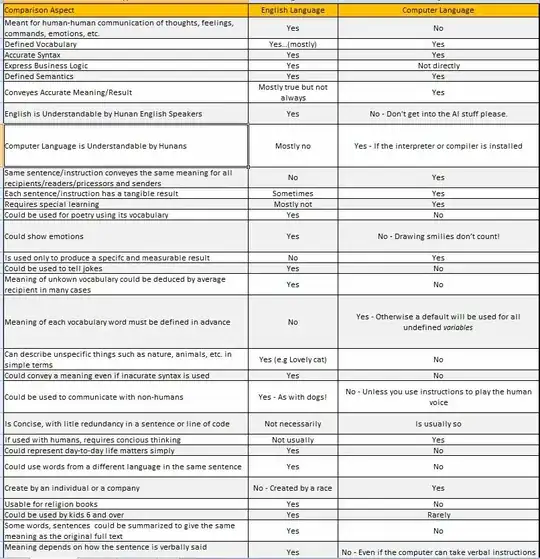"A programming language is only useful for a PC" isn't fair you're right.
Fair way to state the difference would be
A programming language is also useful for a PC
The point is, programming language (just like English) is primarily intended to be read / communicated by humans, but unlike English, it has a cumbersome limitation that it has to allow for machine execution.
...Writing code certainly feels very similar to writing poetry. When I'm writing poetry, it feels like the center of my thinking is in a particular place, and when I'm writing code the center of my thinking feels in the same kind of place. It's the same kind of concentration. So, I'm thinking up possibilities, I'm thinking about, well, so how do I reinvent the code, gee, you know, what's the simplest way to do this.
I'm thinking about things like simplicity -- how easy is it going to be for someone to look at it later? How well is it fulfilling the overall design that I have in mind? How well does it fit into the architecture? If I were writing a very long poem with many parts, I would be thinking, "Okay, how does this piece fit in with the other pieces? How is it part of the bigger picture?" When coding, I'm doing similar things, and if you look at the source code of extremely talented programmers, there's beauty in it. There's a lot of attention to compression, using the underlying programming language in a way that's easy to penetrate. Yes, writing code and writing poetry are similar...
(Richard Gabriel, Janice J. Heiss, The Poetry of Programming)
...Instead of imagining that our main task is to instruct a computer what to do, let us concentrate rather on explaining to human beings what we want a computer to do.
The practitioner of literate programming can be regarded as an essayist, whose main concern is with exposition and excellence of style. Such an author, with thesaurus in hand, chooses the names of variables carefully and explains what each variable means. He or she strives for a program that is comprehensible because its concepts have been introduced in an order that is best for human understanding...
(Donald E. Knuth, Literate Programming)
 - Add to the list the fact that recursion is meaningful to computers only and not to humans.
- Add to the list the fact that recursion is meaningful to computers only and not to humans.